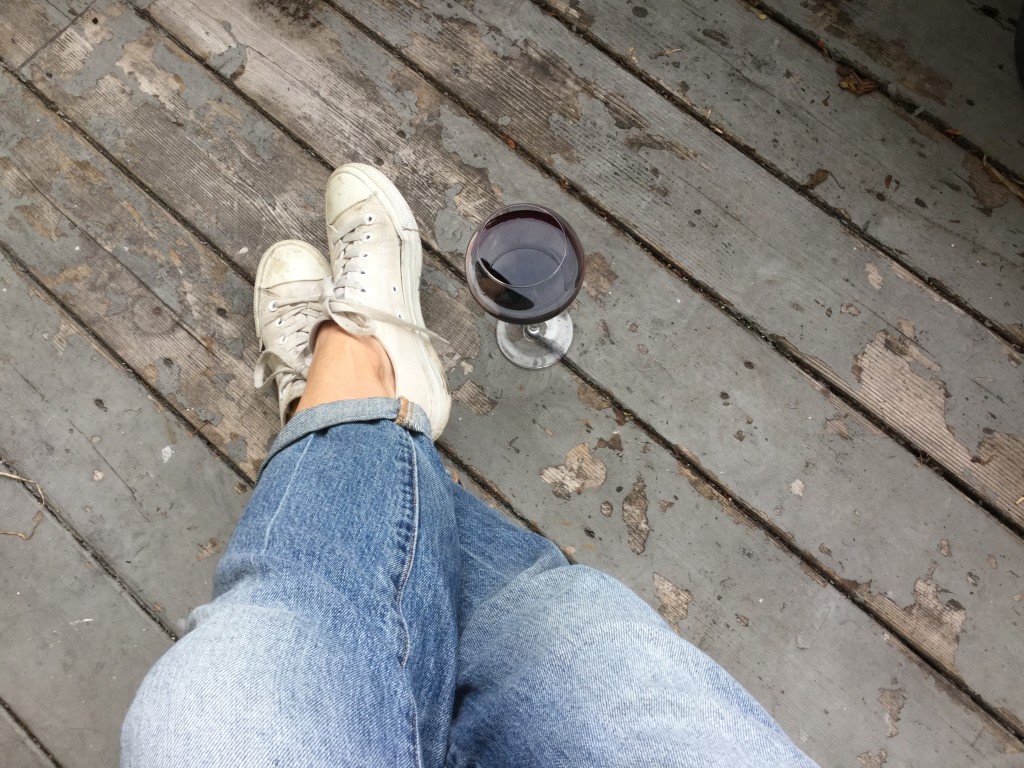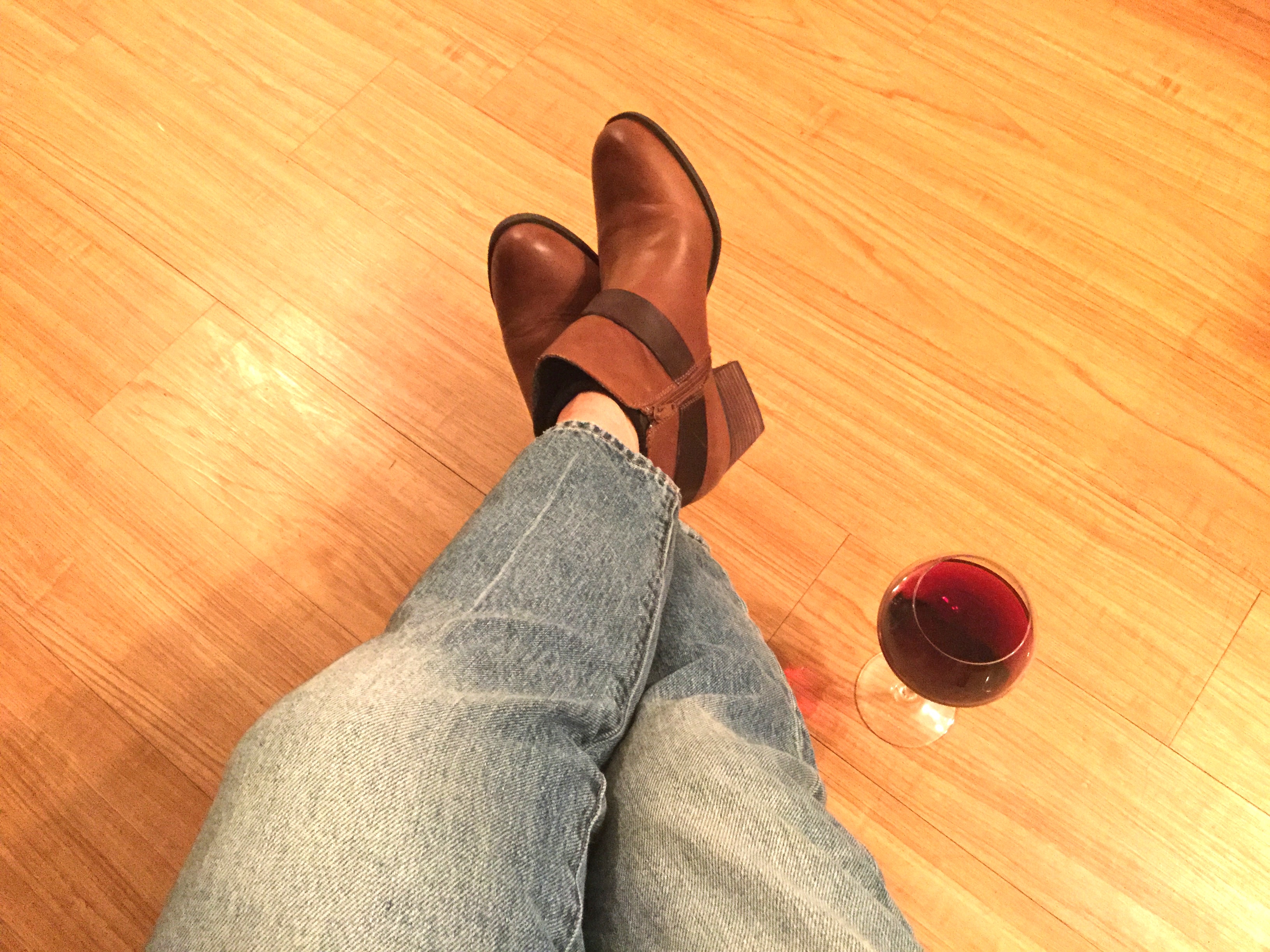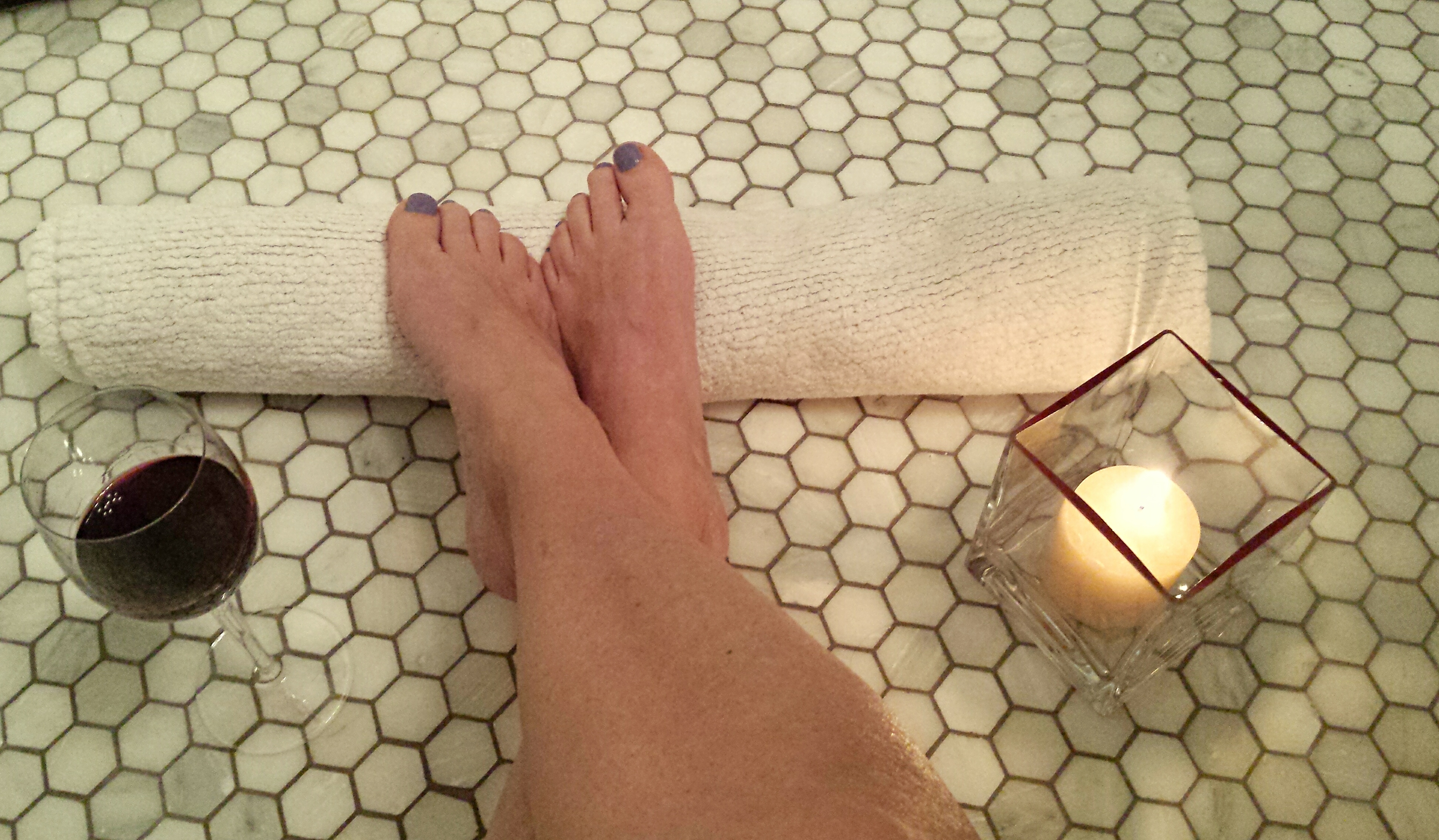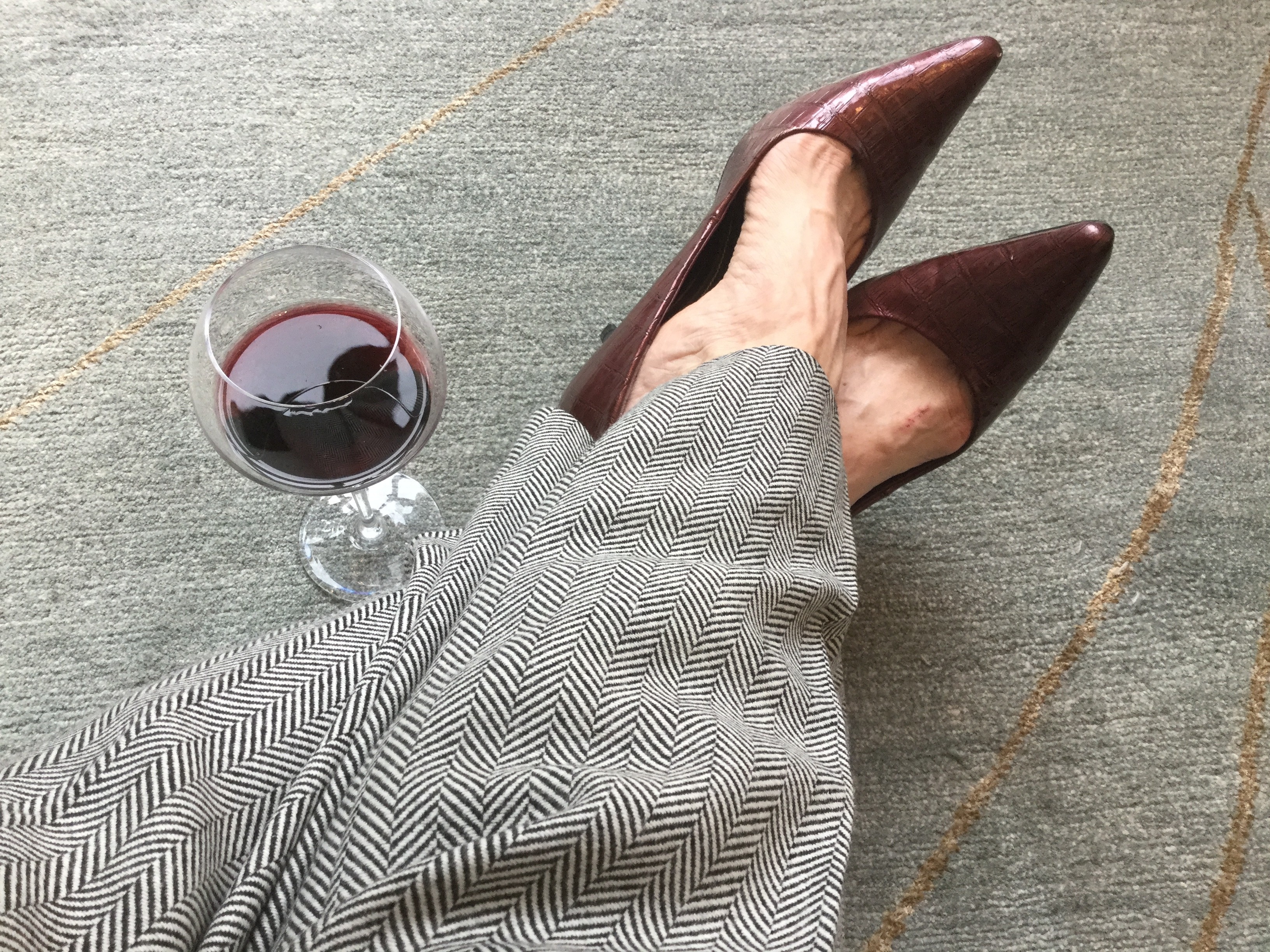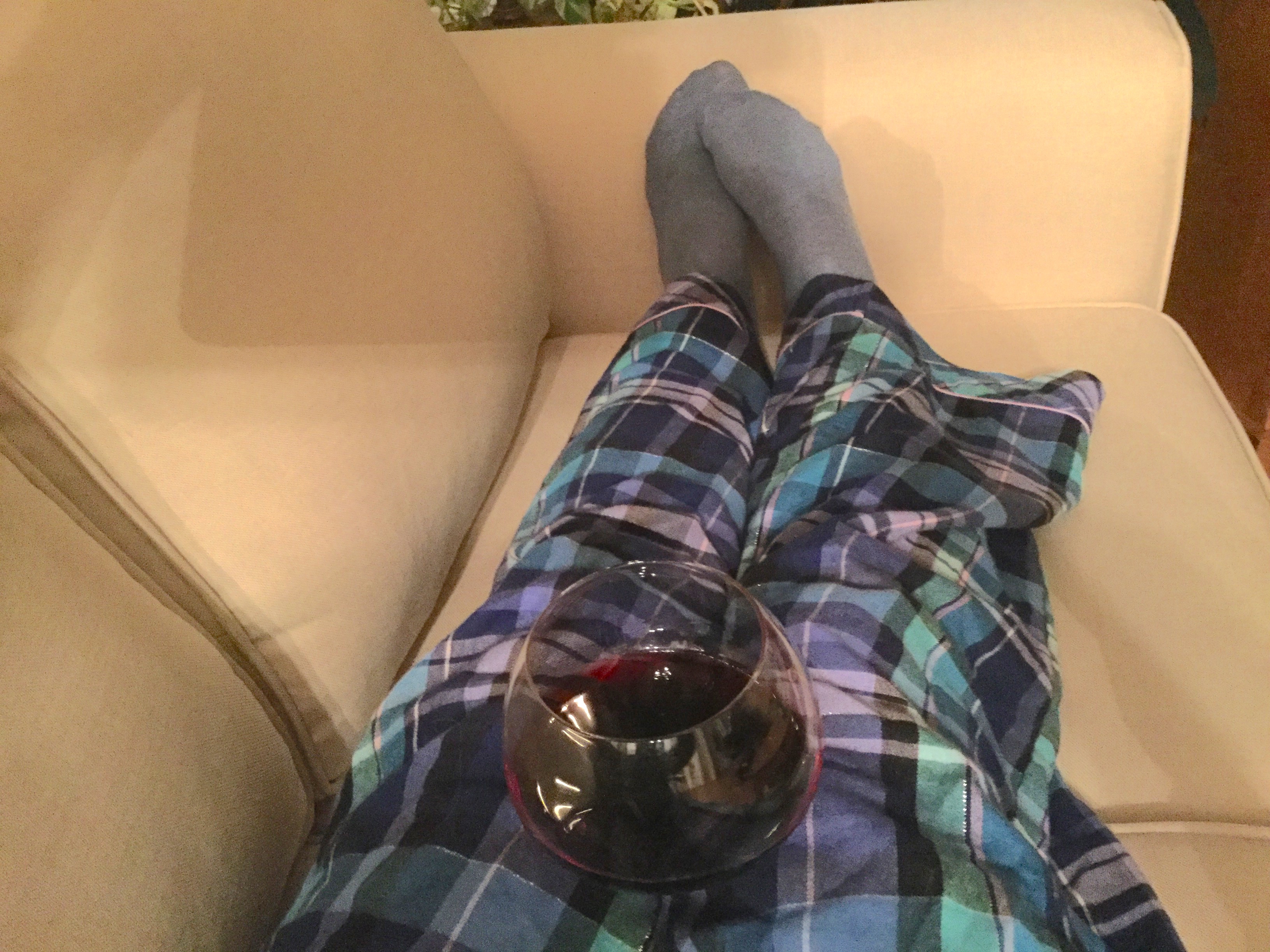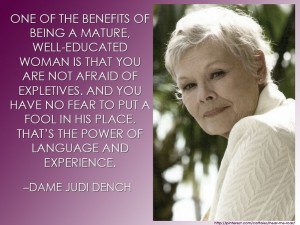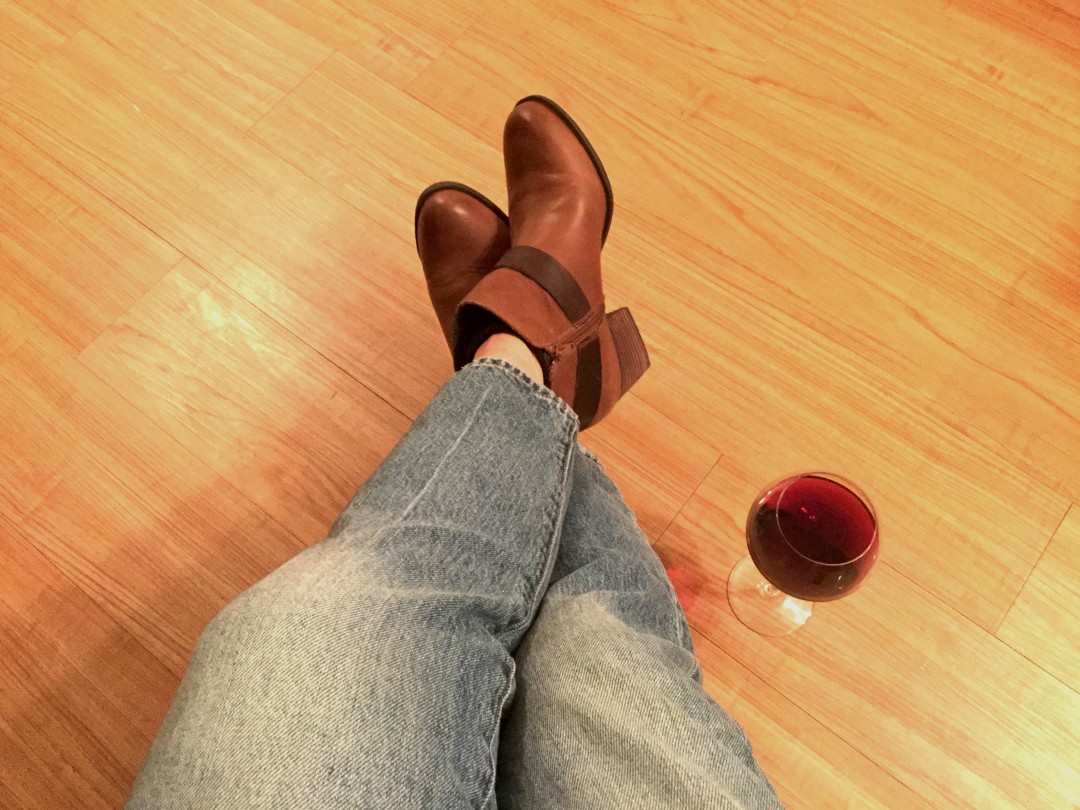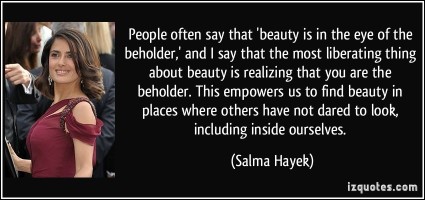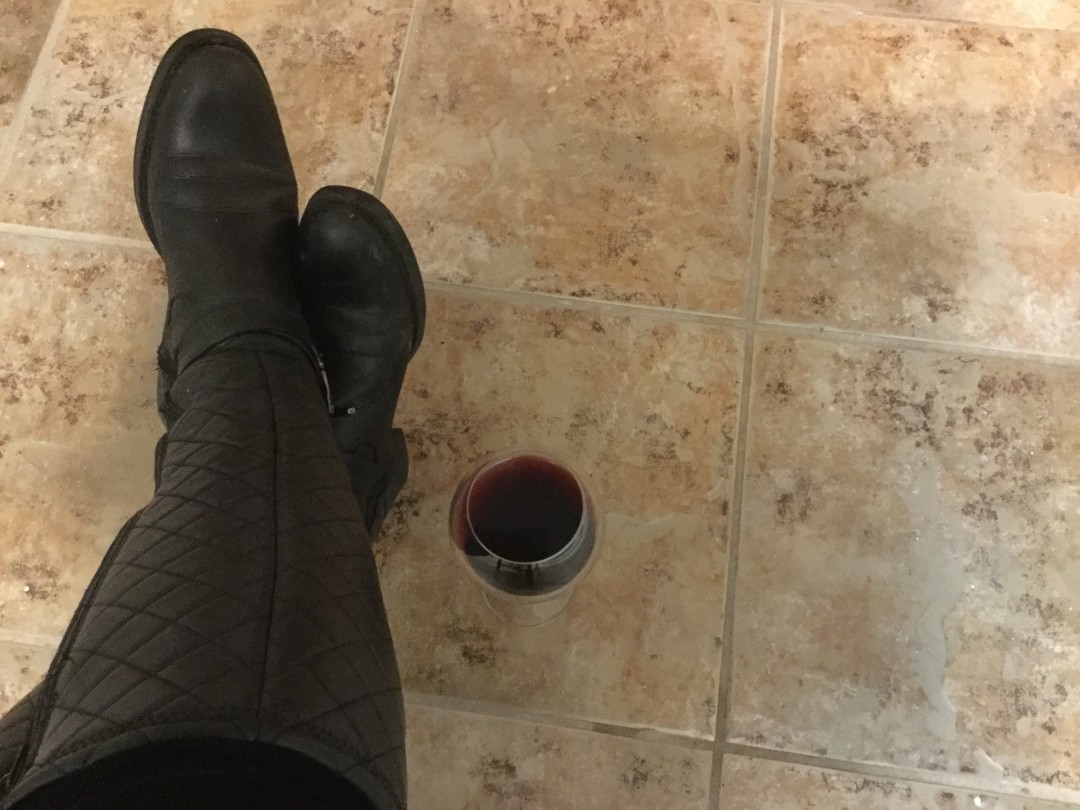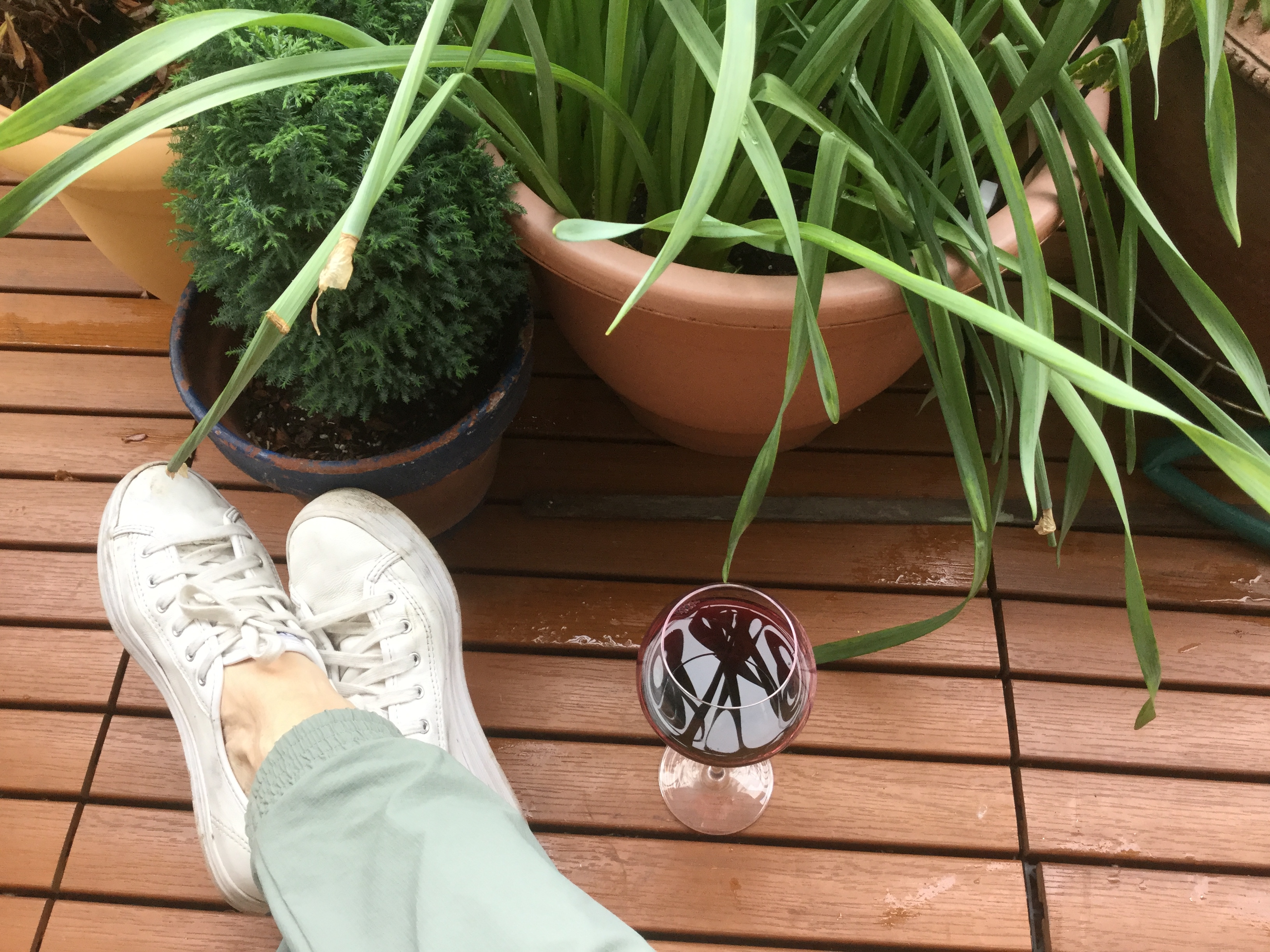 The lucky caregiver and other absurdities.
The lucky caregiver and other absurdities.
My mom is 102 years old. She was diagnosed with congestive heart failure and given weeks to live, maybe months. She moved into my one-bedroom apartment to spend her final days under my care.
That was eight years ago.
The other day, a friend of mine lamented I was lucky to still have her given that her own mother died at 60 years old. I’ve had other friends share the same sentiment.
I’m lucky, they say.
I miss the mother I had at sixty, seventy, eighty, even ninety
But, here’s the thing – I too miss my mom. I miss the mother I had at sixty, seventy, eighty, even ninety. I miss the days prior to commodes, dentures, adult diapers. I miss the smell of fresh baked cookies, strong hugs and quick wit. I miss when she knew how to answer a phone or even a question.
Like you, I miss my mom.
My mom isn’t the mother my friends look back on with longing. Nor is she the mother I look back on with longing. She’s the remarkable woman I have now. I love her. I respect her. I’m privileged and honoured that I’ve been entrusted with this important responsibility.
But I’m not lucky. At least, not in the romanticized, wistful way that my friends envision.
The days of birthday cakes, egg salad sandwiches served warm and a comforting bowl of soup are over. My mom can no longer make a cup of tea or even pour herself a glass of water. It’s been years since she’s been in a kitchen. She can’t let go of her walker long enough to open a fridge, nor does she have the strength to do so.
In addition, she’s lost some of the cognitive function needed to follow a recipe. Even putting on sweater the right way escapes her.
I miss the days of her martinis with extra olives
I miss our restaurant outings and her martinis with “extra olives” that she’d order – and actually send back – if they weren’t made with vermouth. Nowadays everything has to be watched from her sodium levels (which limits most hot dishes) to her potassium levels (green leafy salads are out). Simple dishes are a challenge.
The last time we went to a restaurant was to celebrate my birthday. We arrived at 4 p.m. hoping to have an early dinner. We were gone by 4:30. The effort it took to get my mom dressed and over to the restaurant wiped her out.
I had one wine. She had one Shirley Temple. Then I took her home, made her dinner, and helped her to bed. I ate alone later. That was it. That was my big night out. Not quite the experience my friends reminisce about.
We don’t sit around chatting over drinks anymore either. She can’t tolerate alcohol. I sent her a sympathy card about it for fun. The cover of the card said sorry for your loss and, inside, I wrote, “I know how much alcohol meant to you. Sending my heartfelt condolences”.
We had a good laugh. But, by the next day, she forgot all about it and, by dinnertime, she forgot that she couldn’t drink.
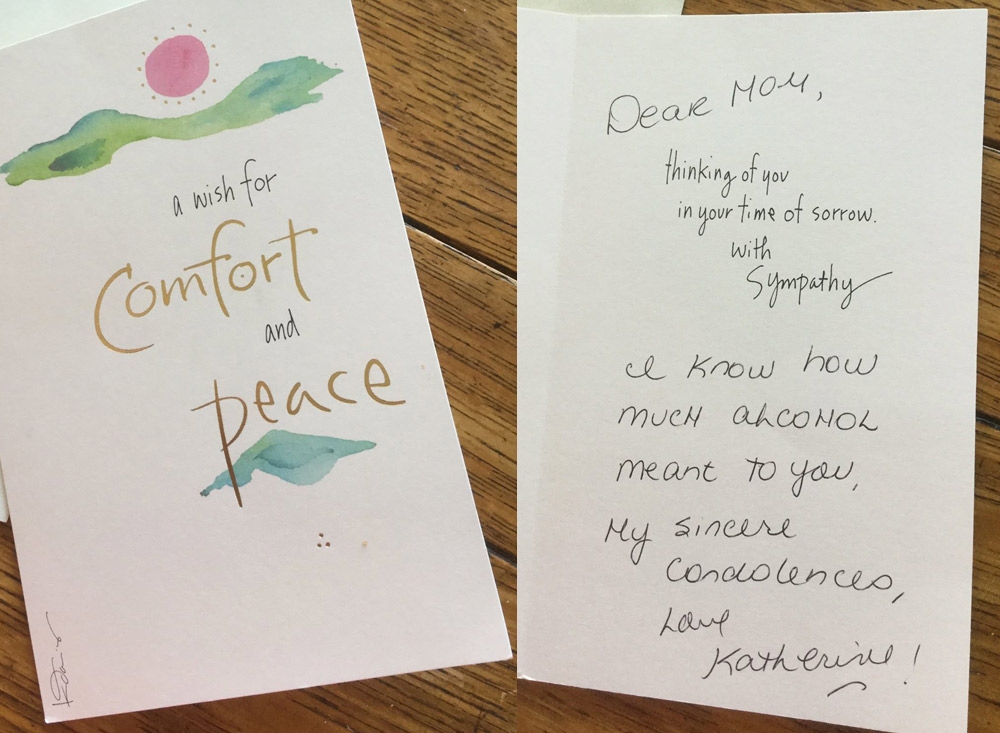 I ended up serving her white grape juice and telling her it was wine. I’ve been doing that ever since. I’m not trying to trick her. I just want her to keep enjoying the experience.
I ended up serving her white grape juice and telling her it was wine. I’ve been doing that ever since. I’m not trying to trick her. I just want her to keep enjoying the experience.
Mother and daughter talks are not what they were
My mom had her Master’s degree in social work. She was considered a pioneer by many for some of the initiatives she implemented in her field. I could go to her for insight on friends, lovers, employers. She had a talent for understanding core aspects of personalities and what motivated them. I loved talking with her about relationships of every kind.
I learned so much from her.
My friends tell me they miss their mother and daughter talks. Well, guess what? I do too. Here’s how ours play out not once, not twice, but a few times a day:
“One, two, three, up. Do you feel safe? Okay then walk. Hold onto your walker. Stay with your walker. Put your hand here, put the other hand there. Do you feel safe? Okay, I’m lowering your underwear. Now you can sit. Here’s the toilet paper, here are the hand wipes. Are you finished? Did you wipe? Okay, one, two, three. Wait until I have your underwear up. Okay, hold onto your walker”.
That’s just the toilet. Other conversations go like this: “Drink your water. Don’t take out your hearing aids. Put on your glasses, okay? Do you need to go the bathroom? Do you want heat on your hands? Are your feet cold? Do you want music on?”
The monotony can be suffocating
The amount of repetition I do in a day sucks the life out of my brain and that doesn’t even take into account all the repetition I have to listen to. I changed my mom’s bread about three months ago. Every single day since, sometimes twice a day, she’s told me how good this new bread is.
That’s every single day, twice a day, multiplied by 90 days.
She’s also told me repeatedly how much she likes the grey housecoat I bought a year ago and how much she loves the painting that’s been over her bed…for the past seven years.
She wakes up with songs in her head that date back to the 1930’s and asks me if I remember them. She makes references to experiences that I’ve never had with her. She asks me about uncles and aunts who died before she was an adult let alone after I was born.
There was a period of about a year where she spoke frequently about her stepmother who was terrible to her. The memories would cause her distress all over again. But could I get her off the subject? Never. For some reason, her brain will lock onto a thought and not let go for months at a time.
It’s a remarkable mind, but it’s 102 years old
My mom’s mind is remarkable, but it’s 102 years old. She can contribute to, and keep up with, simple conversations. Some days (or, rather, some periods in a day) she can be really bright. She has a terrific sense of humour too, which can catch you completely off guard.
People are always amazed at how sharp she is – and she is, for 102 years old.
What’s interesting is that people don’t realize how much they, themselves, are doing the talking and then walk away marvelling at my mom’s mental acuity. People automatically compensate for her without even realizing it. It’s pretty sweet actually.
I love my mom. I do my best to be gracious when she repeats herself. Oh but it can be mind numbing.
I don’t need advice. I need support
More recently, my mom has been stuck on the notion that some obsolete politician is back in the news. I have no idea how that became lodged into into her mind. But it has and he’s not.
She mentioned it to a friend of mine. Once again I found myself correcting her and, this time, with an underlying tone of impatience. I later explained the tone to my friend. He suggested that, the next time Mom repeats herself, I should pretend it’s the first time I’ve heard it.
So, every time she tells the same story over and over again, in a short period of time, I should just act like I’ve never heard it before. That was the advice.
This is one of the warmest, nicest people I know. All he was trying to do was be helpful. I wanted to kill him.
One day, after a bout of incontinence, I took my mom out for a walk. We met a neighbour who looked at us tenderly and gave me the “you’re so lucky” look. She too is one of the warmest, nicest people I know. She too, I wanted to kill.
I should carry duct tape around to cover the mouths of people who say the wrong things.
I once watched a 30 second awareness video on elder care that came up on my Facebook page. It featured an elderly father walking slowly with a cane alongside a clearly impatient daughter. Scathing comments about the daughter kept showing up below the video. Meanwhile, all I could think was how painfully slow he was walking and how difficult that must have been for her.
My Mom walks five blocks a day. She’s impressive. She really is. But it takes her two hours. You cannot imagine the patience it requires to accompany her. It’s so tedious.
There are many reasons for a caregiver to become impatient. The most poignant is denial. That’s when you get annoyed at a loved one who can’t do the simplest thing because being annoyed is easier than accepting the truth – that the person you love continues to decline.
Have I thought of putting my mom in a home?
Gee, let me see
I’ve had people ask if I ever thought of putting my mom in a home. Well, yes, I have thought of the obvious. But if a caregiver hasn’t done that then there are reasons. For many it’s finances. For others, it’s guilt or sense of obligation.
In my case, she was never expected to live this long. I also could never have imagined all the care it would require. Right now, she has true quality of life. She’s happy. She feels safe and loved. She has beaten all the odds. There’s no way that I want to break her heart at this stage of her life. So, I choose not to.
I once had a friend tell me how she had helped get her dad in a home and how good it was for him despite initial objections. She relayed her story as a parallel to mine in the hopes that I’d take her veiled advice.
In fact, her dad lived alone in a rural area 2,000 miles away from her. She hadn’t lived with him in 40 years and only visited on occasion. They were neither close geographically or emotionally. The only parallel to my situation was that he was old.
Yet, she was trying to give me a teaching moment. By the way, whoever said life is short, never had to listen to advice about situations that are nothing like yours.
In addition, do people actually think that, when you place a parent in a home, all your cares are over? For starters, the decision itself is wrenching. You also have to find a home that suits your parent’s emotional, physical and financial realities. Then, once in the home, you have to schedule regular visits and check up very thoroughly on the staff responsible for her wellbeing.
Surely I’m not the only one who’s read stories of poor management, negligence and mishandled medications? When my mom was in the hospital being treated for pneumonia, the doctors mistakenly put her antipsychotics. It took me three days of alerting over seven residents to this mistake before someone finally realized they were wrong and I was right!
I’ve also been asked if I can get help. Yes, I can. But good help? That’s hard to come by. I had a caregiver who’d stick her gum on the door before entering the house. I had one who nearly took my mom out with wet hair. Another left my mom alone on the balcony when her shift ended and didn’t bother bringing her inside for safety. I had caregivers who didn’t show up or showed up drunk. I also had one who stole.
Fortunately I do have a really good one. Unfortunately, she’s so good that she has a lot of other clients.
I love my mom as she is and I love doing this for her
Don’t get me wrong I love my mom. She’s kind, good-natured, always grateful. She’s joyful and easy to be around. I love being on this journey with her. We have many warm, tender moments, as well as laughs.
In addition, I get to perform acts of love several times a day, every day. I’m grateful.
But I’m not lucky.
So stop it. Stop saying that. When I hear it, I feel annoyed, resentful and, mostly, I feel lonely – a feeling I don’t need more of. My constant companion is not only a 102 year old, but one whose needs far eclipse mine. I’m rarely given a second thought.
I was on the phone once with someone and mentioned that I was getting surgery the next day for a broken wrist. Rather than ask about me, he asked who’d be looking after my mom. It’s astonishing how little I can matter.
Today my mom fell. While people helped her up and made sure she was okay, someone put a hand on my back and rubbed it. I cannot tell you how that restored me.
You’re grieving your loss while denying me of mine
But the deepest loneliness comes from hearing how lucky I am. When you say that, you’re grieving your loss while denying me of mine.
I miss the mom I had. I especially miss her now when I’m going through so much. People have said it’s like having kids. It’s not. Kids flourish. Meanwhile, I live with decline and death. The depression is crushing.
Every morning I open the door to her room and sniff to make sure she didn’t die overnight. Then I walk over to her and check to see if she’s breathing just in case she died in the last few minutes.
I’ve lost paid work and along with this all the social, intellectual and creative stimulation it afforded me. I’ve lost friends who can’t navigate my schedule. I’ve lost my time. I’ve lost the freedom to plan for my future. I have no idea when this will end.
I dread my mom’s death yet there have been so many close calls. I can’t tell you what that constant stress can do to your soul. I also live with the internal conflict of wanting this to be over, done, finished, while at the same time, never wanting it to end. I don’t want her to die.
Right now I miss my mom more than ever
Right now I miss my mom more than ever. I’d love for her to give me a big hug. I’d love for her to tell me that everything will be all right when, of course, it won’t be. Once this journey is over, I’ll not only go through the grief of a daughter who lost her beautiful mother, but I’ll also have to face caregiver’s grief.
That’s the huge emptiness that comes when everything in your life is set up to care for one person and then that person is gone.
So feel free to tell me about your mom and share how much you miss her. But stop telling me I’m lucky. Stop denying my loss and romanticizing my reality.
